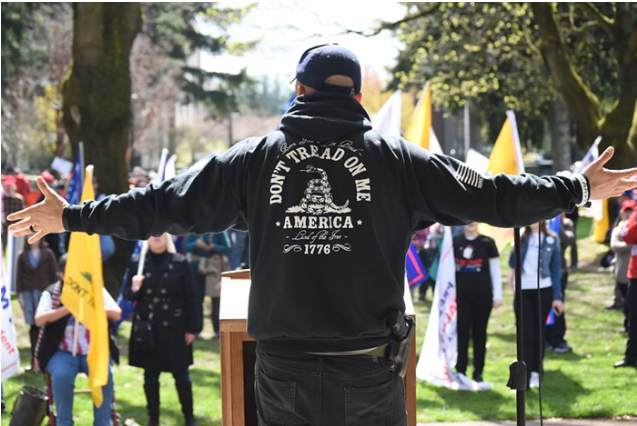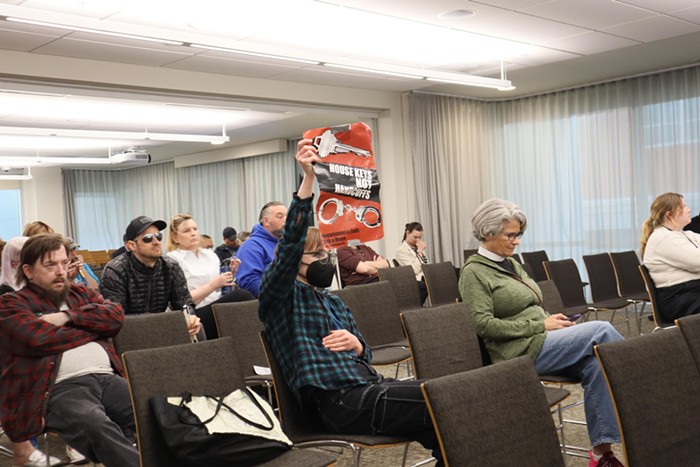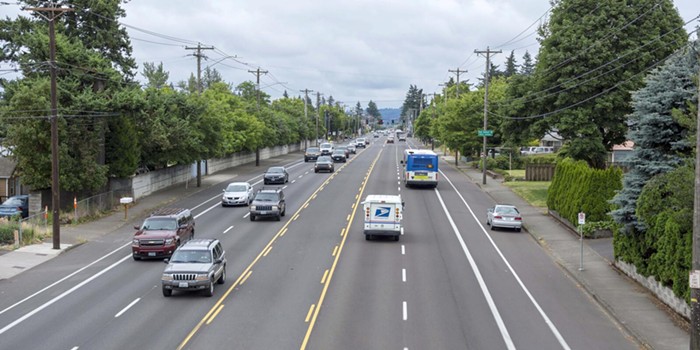
Joey Gibson, the leader of alt-right group Patriot Prayer, says a lawsuit filed against him by Portland bar Cider Riot is simply a tool to limit his constitutional right to protest.
In a legal motion filed this afternoon, Gibson's lawyer James Buchal (who also serves as the chairperson of Multnomah County GOP) argues that his client is the target of a Strategic Lawsuit Against Public Participation (SLAPP), a name for litigation that appears specifically crafted to intimidate and silence critics. Buchal says Gibson is simply using his First Amendment rights to stamp out anti-fascists (better known as Antifa).
Here's how Gibson describes antifa members in his personal declaration in support of the motion:
"I and many others believe that the United States is currently engaged in a spiritual struggle against evil, manifested in many ways. One manifestation of this evil is the rise of violent, thuggish gangs operating in the City of Portland, Oregon, which attack fundamental American values and support a Godless socialist or communist regime, the establishment of which would threaten America’s future."
Buchal's anti-SLAPP motion accuses Cider Riot owner Abram Goldman-Armstrong of acting on behalf of local antifa groups.
Goldman-Armstrong filed a lawsuit against Patriot Prayer, Gibson, and several other members of Patriot Prayer on May 3, two days after the right-wing provocateurs engaged in a violent street fight outside of his business.
Patriot Prayer decided to march to Cider Riot—following a day of peaceful May Day rallies—after learning that people associated with antifa were at the pub.
Videos of the confrontation show members of Patriot Prayer approaching Cider Riot's outside patio dressed in armor, wearing helmets, and wielding batons. After shouting insults at the patrons, one man with Patriot Prayer sprays people sitting on the patio with mace, kicking off a violent melee that ended with at least one woman being sent to the hospital.
Goldman-Armstrong's lawsuit charges Gibson with acting negligently and trespassing on private property, and requests a trial by jury. The May 3 complaint references Gibson's history in leading protests in downtown Portland that often turn violent.
"Patriot Prayer and Gibson’s tactics vary from convening protesters to intimidate minorities, immigrants and/or leftists, to direct violence, to campaigns of terror under cover of night," the lawsuit reads.
Gibson rejects these claims, claiming that his main goal in holding public events is to "save members of the public by restoring an appreciation for the Nation’s founding principles, both spiritual and as embodied in our Constitution and Bill of Rights."
"In general, I attempt to engage members of Antifa one [on] one and come to a dialog, trying to get them to wake up and cease affiliation with Antifa," Gibson writes in his declaration. "When members of Antifa respond with violence, I remain nonviolent and do my best to publicize their response, so as to show Americans the nature of Antifa, and the threat it poses."
Buchal argues that Gibson is not unlike members of the Westboro Baptist Church, whose ability to protest LGBT rights at funerals of LGBT soldiers was upheld by the US Supreme Court, which determined the group's messaging was "of public concern."
Just because Gibson's political views are unpopular in Portland, Buchal writes, he shouldn't have to forfeit his right to protest.
"The court may regard Mr. Gibson's attempts to induce the Antifa participants to see the evil of their ways as no more likely to succeed that the Westboro Church's attempts to change social views concerning homosexuality," Buchal writes. "But the conduct is protected."
Gibson goes on to accuse Congressman Earl Blumenaur, Mayor Ted Wheeler, several Portland city commissioners, left-wing activists, nonprofit organizations, and multiple news outlets (including the Mercury) of falsely portraying his work and motivation.
It's this widespread criticism of Gibson that's led him to request that, if a trial is held, it takes place outside of the Portland metro region.
"The political environmental within Multnomah County and the City of Portland is so hostile and prejudicial that anyone who dares treat me as anything other than a violent racist Nazi will suffer adverse consequences," Gibson writes. "I believe I cannot possible get a fair trial in the... Portland area."




















